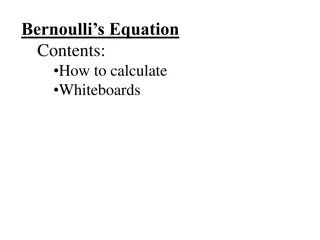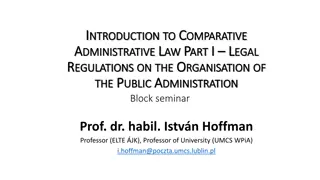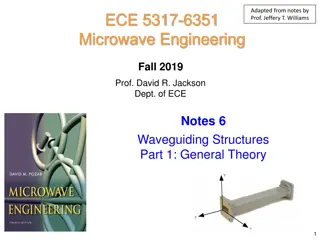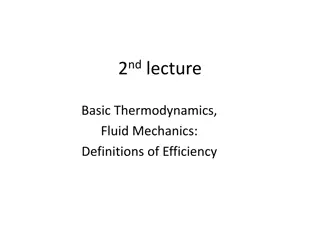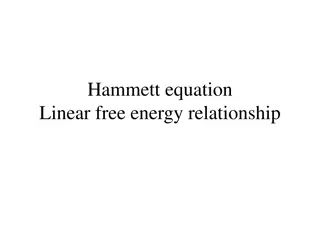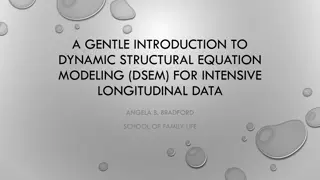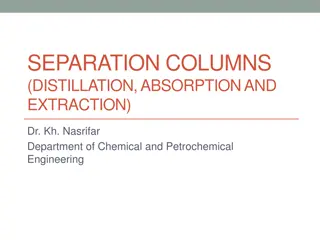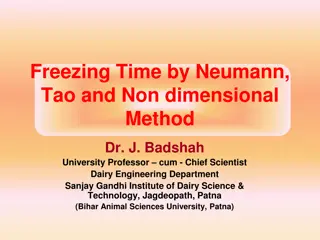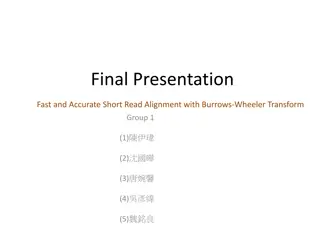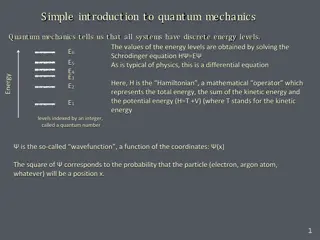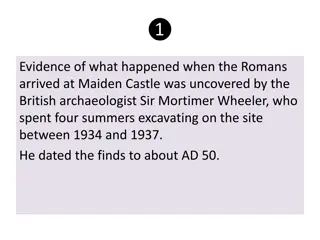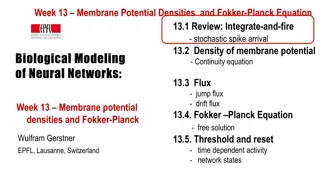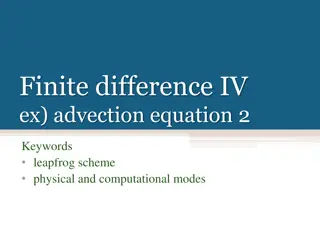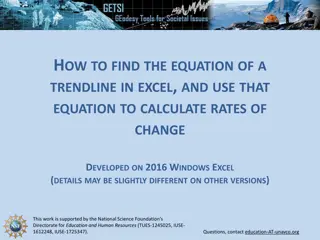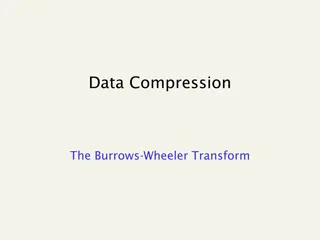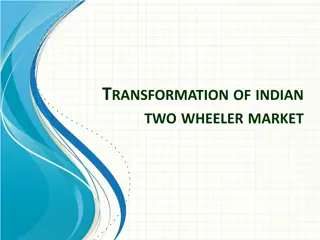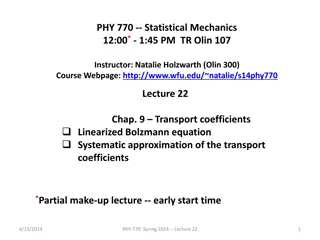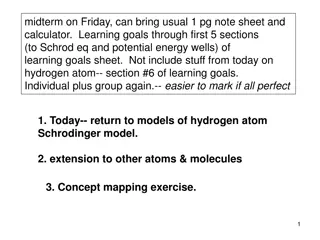Fundamental Comparison: Wheeler-DeWitt vs. Schrödinger Equation
The debate on whether the Wheeler-DeWitt equation is more fundamental than the Schrödinger equation in quantum gravity remains inconclusive. While the Wheeler-DeWitt equation presents an elegant formulation, the Schrödinger equation is essential in specific cases. The issue of time and coordinate systems complicates this comparison. Quantum gravity must encompass all gravitational phenomena and derive the equation for the wave function of the Universe through a rigorous procedure, with the Wheeler-DeWitt equation emerging under certain conditions. Further research is needed to determine the true fundamentality between these two equations.
Uploaded on Sep 10, 2024 | 0 Views
Download Presentation

Please find below an Image/Link to download the presentation.
The content on the website is provided AS IS for your information and personal use only. It may not be sold, licensed, or shared on other websites without obtaining consent from the author. Download presentation by click this link. If you encounter any issues during the download, it is possible that the publisher has removed the file from their server.
E N D
Presentation Transcript
Is the Wheeler - DeWitt equation more fundamental than the Schr dinger equation? T. P. Shestakova Department of Theoretical and Computational Physics, Southern Federal University, Sorge St. 5, Rostov-on-Don 344090, Russia E-mail: shestakova@sfedu.ru
Is the Wheeler - DeWitt equation more fundamental than the T. P. Shestakova Schr dinger equation? The Wheeler DeWitt equation: B. S. DeWitt, "Quantum theory of gravity. I. The canonical theory", Phys. Rev. 160 (1967), P. 1113. ...although it may be heretical to suggest it, the Wheeler DeWitt equation elegant though it be may be completely the wrong way of formulating a quantum theory of gravity. C. Isham, "Canonical quantum gravity and the problem of time", lectures presented at NATO Advanced Study Institute, Salamanca, June 1992. The problem of time and related problems, seemingly, cannot be resolved in the framework of the Wheeler DeWitt Quantum Geometrodynamics. In our attempts to quantize gravity we are in the situation when no observational data can confirm or reject a fundamental status of the Wheeler - DeWitt equation, so we can give just indirect arguments in favor of or against it, grounded on mathematical consistency and physical relevance.
Is the Wheeler - DeWitt equation more fundamental than the T. P. Shestakova Schr dinger equation? Is the Wheeler DeWitt equation just a generalization of the Schr dinger equation? C. Rovelli, "The strange equation of quantum gravity", Class. Quantum Grav. 32 (2015), 124005. C. Rovelli and F. Vidotto, Covariant Loop Quantum Gravity. An Elementary Introduction to Quantum Gravity and SpinfoamTheory, Cambridge University Press, 2014. The constraints have a fundamental significance, and the Schr dinger equation can be written only in particular cases.
Is the Wheeler - DeWitt equation more fundamental than the T. P. Shestakova Schr dinger equation? There does not exist a preferred time as well as a preferred coordinate system. However, to get any solution to the Einstein equations, one has to choose both. "The chosen time variable" is not the same as "the preferred time variable". "A chosen reference frame" must be a bridge between quantum theory of gravity and observations which are necessary to verify it and which imply measurements in space and time. The assumptions about the future quantum theory of gravity: Quantum theory of gravity must be applicable to all quantum gravitational phenomena from the early Universe to effects in strong gravitational fields. The equation for the wave function of the Universe must not be postulated but derived by means of a mathematically consistent procedure. Such a procedure exists in path integral quantization. When applying this procedure to any gravitating system, one should take into account features of gravity, especially, non-trivial spacetime topology. This procedure leads to the Schr dinger equation for the wave function of the Universe, meantime the Wheeler DeWitt equation follows from it under some particular conditions.
Is the Wheeler - DeWitt equation more fundamental than the T. P. Shestakova Schr dinger equation? The extended phase space approach to quantization of gravity: V. A. Savchenko, T. P. Shestakova and G. M. Vereshkov, "Quantum Geometrodynamics of the Bianchi IX model in extended phase space", Int. J. Mod. Phys. A14 (1999), P. 4473 4490. V. A. Savchenko, T. P. Shestakova and G. M. Vereshkov, "The exact cosmological solution to the dynamical equations for the Bianchi IX model", Int. J. Mod. Phys. A15 (2000), P. 3207 3220. V. A. Savchenko, T. P. Shestakova and G. M. Vereshkov, "Quantum Geometrodynamics in extended phase space - I. Physical problems of interpretation and mathematical problems of gauge invariance", Gravitation & Cosmology 7 (2001), P. 18 28. V. A. Savchenko, T. P. Shestakova and G. M. Vereshkov, "Quantum Geometrodynamics in extended phase space - II. The Bianchi IX model" , Gravitation & Cosmology 7 (2001), P. 102 116. The general solution to the Schr dinger equation: The isotropic model The spherically symmetric model
Is the Wheeler - DeWitt equation more fundamental than the T. P. Shestakova Schr dinger equation? The physical picture one can get in the extended phase space approach strongly depends on a chosen reference frame. Is it a bad news for this approach? Yes, if one postulates that quantum theory of gravity must be gauge invariant. However, we do not know what this theory will be. Effects in strong gravitational fields and in accelerating frames indicate that physical phenomena are indeed related to reference frames. In the Wheeler DeWitt approach consideration of these phenomena, as well as appearance of time, is possible only in quasiclassical approximation. Just the opposite, in the extended phase space approach, which leads to the time- dependent Schr dinger equation, there exist a theoretical possibility to give a complete description of these phenomena.


